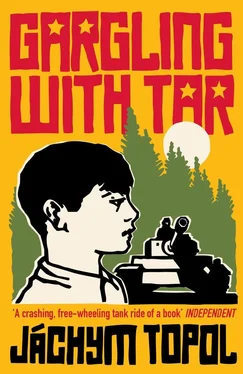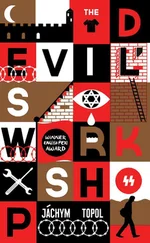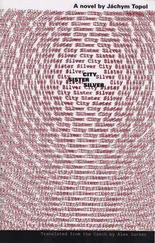‘Obviously,’ the dwarf said, getting excited, ‘no-one can expect the Soviets to carry libraries on their tanks. But what better means can there be for educating the masses or filling their spare time than a circus?’
I didn’t know. I’d never been to a circus, so I said nothing.
‘Brilliant Soviet thinking is fed by the powerful wellspring of those Eastern philosophical systems that anticipate a worldwide dominion made up of the brotherhood of animals and men. The new world empire, whose vanguard we are, will also include machines,’ said Dago, gently rapping the tank with his knuckles. ‘In the world’s new Eastern Empire no-one will ever again humiliate or enslave man, beast or machine,’ Dago continued, warming to his theme. ‘And a big top’s as good a place as any for the masses to swear their allegiance to the Soviet Union.’
I also learned that the East German circus had been the backbone of Project Socialist Circus. The zone secured by Captain Yegorov’s unit was to have gradually become a home to circuses from all five of the states involved in the invasion of Czechoslovakia. The hippo found in the well was, for example, the first hippo to have been born in the zoological gardens of the Hungarian People’s Republic, while the dead giraffe had once been the star attraction of the renowned Warsaw Variety Theatre.
The mainstay of the circus corps was obviously to be the East German Hygea Circus, with its bareback riders — ‘the most beautiful girls in the world’ — and its clowns, because ‘German clowns are the funniest in the world, you know,’ insisted Dago. ‘But the cause seems to be lost,’ he added, wrinkling his nose sadly. ‘It looks as if the circus has been pulverized by Czech bandits. It’s a great shame! These Czech diehards are their own worst enemies. They’re depriving themselves of a magnificent, joyful show and they’ll be the laughing stock of the entire civilized world. I’m so sorry for the performing animals, but also for the performers who will perish in this dreadful country.’ Dago was least concerned for the Polish magicians, who probably felt quite at home in Chapman Forest, but as for the gorgeous East German trapeze artistes and bareback riders… every time Dago howled I had to choke him with a tug on the rope.
And I shouldn’t have been surprised that Captain Yegorov had been so foul-tempered of late, because he was very worried, as Dago enlightened me. If Captain Yegorov doesn’t execute his mission, he could be up before a tribunal.
‘What?’ I pricked up my ears, because I was quite familiar with the word ‘tribunal’.
‘’Fraid so,’ said the dwarf with a glum chuckle. ‘He’ll be sent to Siberia, the gulag. For twenty years, or life. Or he’ll get a bullet.’ And Dago fell silent. He craned his big head up on his thin neck, probably watching for signs of some animal moving through the bushes and undergrowth of Chapman Forest.
I looked at my legs dangling over the side of the tank next to his, and I squinted at the pinned and rolled-back sleeves of my tank soldier’s jacket, hoping I might have grown a bit again. I must get over this childhood thing as soon as possible, I resolved as our tank trundled down the lane between Chapman Forest and a dust-covered field, where nothing grew that summer, and I clung to the tank’s front hull and waited for my childhood to end.
Captain Yegorov was still in a bad mood. He still tied my feet together at night and untied them in the morning, but he treated me kindly, although he could be very sharp in the way he spoke to the sub-machine-gunners. He went on more and more frequently about the sorry state of our fuel stocks, and he constantly scanned the horizon with binoculars, and he also pored over my maps, and it became obvious to me that he was looking for Siřem, because the provocative Siřem transmitter was getting to him more than anything else.
Thanks to regular radio reports of our whereabouts we encountered plenty of graffiti in Russian, abusive and mocking, which wounded Captain Yegorov’s pride, and it was solely due to these inflammatory broadcasts that we kept on being ambushed.
Then one day the cheerful Kantariya and the dour Timosha were sitting on the front of the tank, and Kantariya had just launched into a jolly song about girls. The sun burnt on our bare heads and the fresh breeze set up by the tank’s motion cooled us, when suddenly, rounding a corner, we spotted two vandals.
They had just been vandalizing a white wall — black paint still dripping from their brushes. Above the unfinished sentence YEGOROV IS A THIEF AND MURD was a picture of Czechia, scowling at the approaching occupying troops, her unkempt hair leaping about the wall like living, burning snakes. The daubers might have had time to complete their graffiti while our tanks were still clattering down the road, except that this time the sub-machine-gunners had run on ahead of us in camouflage dress, darting here and there among the buildings, and they soon caught the two vandals.
I clambered down inside the tank to avoid having to interpret, but I couldn’t get out of it.
The Czechs refused to speak, except when one of them shouted that he wanted to die for freedom, although Captain Yegorov hadn’t asked him about that.
The Captain did ask where their command post was, how to get to Siřem and suchlike, but they said, ‘ Neznaju .’
Then the other Czech ripped open his shirt and shouted that he wanted to die for freedom as well. Captain Yegorov nodded his assent, and the sub-machine-gunners led the vandals out into the yard and shot them.
The tank crushed the paint bucket under its tracks, and the paint on the brushes lying about on the ground dried hard in the glare of the sun, and it looked like tarmac and no good for anything.
The graffiti-vandalized building was a village school, its doors and windows knocked out. It looked as if there had been fighting inside. The ceiling of one of the classrooms had come down and there were piles of rubble all around, but the building was good enough for a short rest break.
In front of the school there was a statue of the warrior Wenceslas. He was armed and equipped in the old style, with a lance and a sword and a shield. He’s our Czech patron saint, the champion of Christendom, as the nuns once explained to me. On the base of the statue the words LET US NOT PERISH, NOR THOSE WHO COME AFTER US were carved in large letters, and when I translated this inscription the Captain just shrugged.
The village appeared to be deserted.
The NCOs appointed patrols and anyone who could and wanted to found themselves a spot to sit down in the cool and shade of the school building.
I must have nodded off, because when I opened my eyes I was alone in the classroom with the collapsed ceiling, except for Captain Yegorov, who was hunched down on the dais in front of the board.
Lying all over the floor were books, torn exercise books, and in the corner a bundle of rags: red, white and blue Czechoslovak flags. It was like a den where someone’s dossed down for a night.
The Captain picked a thick book out of the pile on the floor, flicked through it, then carefully and with interest studied every page in turn. His scowling and grease-blackened face began to bear the signs of a sad smile. Captain Yegorov tore out individual pages, crumpled them and threw them on the floor. He stood up and, although usually so swift, walked slowly out of the classroom.
The book was Brehm’s Animal Life and each of those torn and tossed pages was a portrait of an animal.
I remembered what Dago had told me about what would happen if Captain Yegorov failed in his circus mission. I crossed the classroom and went down the corridor to the back, and through a little window I could see Chapman Forest. I could escape that way. I was only a stone’s throw from the forest.
Читать дальше












